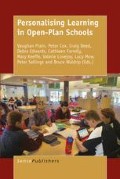Abstract
As noted by Jonassen (2014), computer use has evolved over the last thirty years, deeply diversifying how students learn. This resource now functions variously as a learning guide or tutor (as in access to web-based tutorials and information sites), as a communicative tool with self and others for reasoning, inquiring, and creating or disseminating knowledge (as in the programs in computer games, English, science, and mathematics outlined in other chapters in this book), and as an organiser through which students can self-manage, reflect upon, and enact/improve their learning in systematic ways (as in learning dashboards).
Access this chapter
Tax calculation will be finalised at checkout
Purchases are for personal use only
Preview
Unable to display preview. Download preview PDF.
References
Barsalou, L. W. (2008). Grounded cognition. Annual Review of Psychology, 59, 617–645. doi:10.1146/annurev.psych.59.103006.093639
Biesta, G. (2009). Good education in an age of measurement: On the need to reconnect with the question of purpose in education. Educational Assessment, Evaluation and Accountability, 21(1), 33–46. doi:10.1007/s11092-008-9064–9
Black, P., & Wiliam, D. (1998). Assessment and classroom learning. Assessment in Education, 5(1), 7–74. doi:10.1080/0969595980050102
Britzman, D. P. (1991). Decentering discourses in teacher education: Or, the unleashing of unpopular things. Journal of Education, 173(3), 60–80. Retrieved from http://www.jstor.org/stable/42742229
Edwards, A. (2011). Building common knowledge at the boundaries between professional practices: Relational agency and relational expertise in systems of distributed expertise. International Journal of Educational Research, 50(1), 33–39. doi:10.1016/j.ijer.2011.04.007
Edwards, A. (2014). Epilogue: The end of the beginning. In V. Prain, P. Cox, C. Deed, D. Edwards, C. Farrelly, M. Keeffe, … Z. Yager (Eds.), Adapting to teaching and learning in open-plan schools. (pp. 205–210). Rotterdam, The Netherlands: Sense Publishers.
Engeström, Y. (2005). Knotworking to create collaborative intentionality capital in fluid organisational fields. In M. M. Bayerlein, S. T. Bayerlein, & F. A. Kennedy (Eds.), Collaborative capital: Creating intangible value (pp. 307–336). Amsterdam, The Netherlands: Elsevier.
Gibson, J. J. (1977). The theory of affordances. In R. Shaw & J. Bransford (Eds.). Perceiving, acting, and knowing: Toward an ecological psychology (pp. 67–82). Hillsdale, NJ: Erlbaum.
Hattie, J. A. C. (2009). Visible learning: A synthesis of over 800 meta-analyses relating to achievement. London, UK: Routledge.
Herbert, P. C., & Lohrmann, D. K. (2011). It’s all in the delivery! An analysis of instructional strategies from effective health education curricula. Journal of School Health, 81(5), 258–264. doi:10.1111/j.1746-1561.2011.00586.x
Hill, H. C., Rowan, B., & Ball, D. L. (2005). Effects of teachers’ mathematical knowledge for teaching on student achievement. American Educational Research Journal, 42(2), 371–406. doi:10.3102/00028312042002371
Hillocks, G. (2010). “EJ” in focus: Teaching argument for critical thinking and writing: An introduction. English Journal, 99(6), 24–32. Retrieved from http://www.jstor.org/discover/10.2307/20787661?uid=3737536&uid=2&uid=4&sid=21106496826893
Hoekstra, A., & Korthagen, F. A. (2011). Teacher learning in a context of educational change: Informal learning versus systematically supported learning. Journal of Teacher Education, 62(1), 76–92. doi:10.1177/0022487110382917
Horn, I. (2010). Teaching replays, teaching rehearsals, and re-visions of practice: Learning from colleagues in a mathematics teacher community. Teachers College Record, 112(1), 225–259.
Hwang, G. J., & Wu, P. H. (2012). Advancements and trends in digital game‐based learning research: A review of publications in selected journals from 2001 to 2010. British Journal of Educational Technology, 43(1), E6–E10. doi:10.1111/j.1467-8535.2011.01242.x
Isen, A. M., Rosenzweig, A. S., & Young, M. J. (1991). The influence of positive affect on clinical problem solving. Medical Decision Making, 11(3), 221–227. doi:10.1177/0272989X9101100313
Jackson, A. W., & Davis, G. A. (2000). Turning points 2000: Educating adolescents in the 21st century. New York: Teachers College Press.
Jackson, M., Cassidy, W., & Brown, K. (2009). You were born ugly and youl die ugly too: Cyber-bullying as relational aggression. In Education, 15(2). Retrieved from http://ineducation.ca/ineducation/article/view/57/538
Jenkins, E. W. (2006). The student voice and school science education. Studies in Science Education, 42(1), 49–88. doi:10.1080/03057260608560220
Jonassen, D. H. (2014). Mindtools (productivity and learning). In R. Gunstone (Ed.), Encyclopedia of science education. (pp. 1–7). The Netherlands: Springer. doi:10.1007/978-94-007-6165-0_57-1
Kagan, J. (2009). The three cultures: Natural sciences, social sciences, and the humanities in the 21st century. Cambridge, England: Cambridge University Press.
Kahneman, D. (2011). Thinking, fast and slow. London, UK: Penguin Books.
Kress, G., & van Leeuwen, T. (2001). Multi-modal discourse: The modes and media of contemporary communication. London, UK: Oxford University Press.
Markus, T. (1993). Buildings and power: Freedom and control in the origins of modern building types. London, UK: Routledge.
Mårell-Olsson, E. (2012). Att göra lärandet synligt? Individuella utvecklingsplaner och digital dokumentation [Making learning visible? Personal development planning and digital documentation.] (Unpublished dissertation). Umea, Sweden: Umea University.
O’Brien, M. L., & Johnson, K. (2002). School is for me: Student engagement and the fair go project: A focus on engaging pedagogies in primary classrooms in low socio-economic status communities in south-western Sydney. Paper presented at the Australian Association of Research in Education Conference, Brisbane. Retrieved from http://www.aare.edu.au/data/publications/2002/obr02357.pdf
Prain, V., Cox, P., Deed, C., Dorman, J., Edwards, D., Farrelly, C., Keeffe, M., … Yager, Z. (2013). Personalised learning: Lessons to be learnt. British Educational Research Journal, 39(4), 654–676. doi:10.1080/01411926.2012.669747
Prain, V., Cox, P., Deed, C., Dorman, J., Edwards, D., Farrelly, C., Keeffe, M., … Yager, Z. (2014). Adapting to teaching and learning in open-plan schools. Rotterdam, The Netherlands: Sense Publishers.
Verbert, K., Govaerts, S., Duval, E., Santos, J., Assche, F., Parra, G., & Klerkx, G. (2014). Learning dashboards: An overview and future research opportunities. Personal and Ubiquitous Computing, 18(6), 1499–1151. Retrieved from http://research.acer.edu.au/aer/3
Editor information
Editors and Affiliations
Rights and permissions
Copyright information
© 2015 Sense Publishers
About this chapter
Cite this chapter
Prain, V., Lovejoy, V., Edwards, D. (2015). “It’s Not a Plug-In Product”. In: Prain, V., et al. Personalising Learning in Open-Plan Schools. SensePublishers, Rotterdam. https://doi.org/10.1007/978-94-6300-193-9_5
Download citation
DOI: https://doi.org/10.1007/978-94-6300-193-9_5
Publisher Name: SensePublishers, Rotterdam
Online ISBN: 978-94-6300-193-9
eBook Packages: Humanities, Social Sciences and LawEducation (R0)

